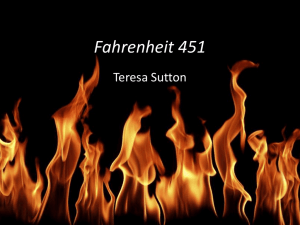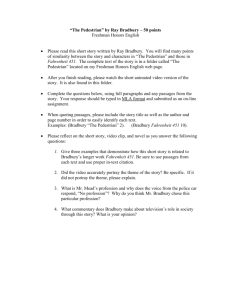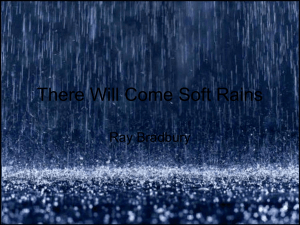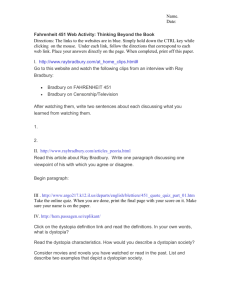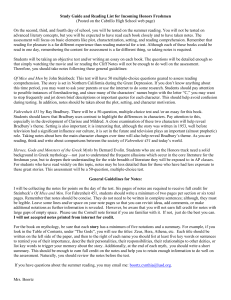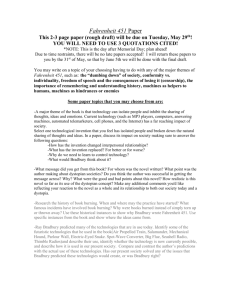Notes - Tri-Valley Local School District
advertisement
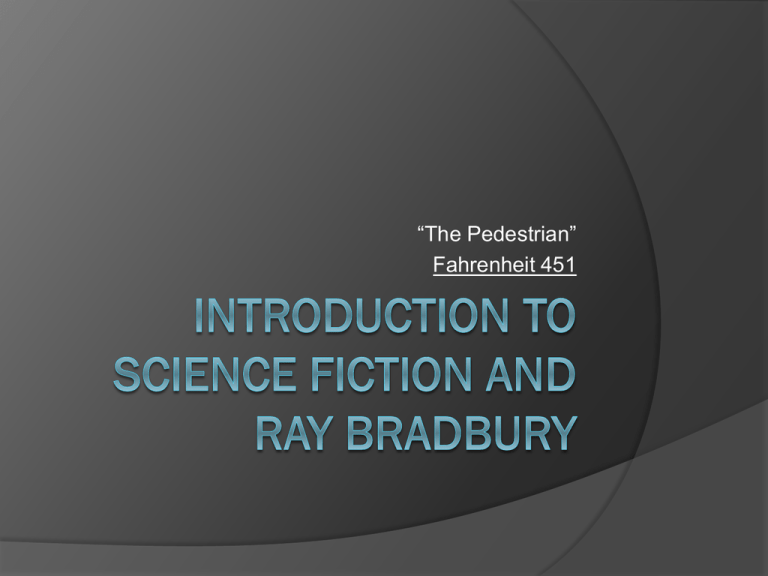
“The Pedestrian” Fahrenheit 451 Science Fiction A genre of literature that deals with the combination of scientific knowledge and imagination. The Giver by Lois Lowry The Hunger Games by Suzanne Collins A story about the future, based on guesses by the author about how the author thinks the future will be robots, space travel, interplanetary war, invasions from outer space Stories are often based on or describe events about some scientific or technological idea Science Fiction utilizes verisimilitude – realistic elements (possibly dates, events or times) to make literature appear more truthful and plausible. Ray Bradbury (1920 – 2012) Born in Illinois, by the age of 8 he was an avid reader of science fiction and comic books (Buck Rogers and Flash Gordon) Moved to Los Angeles at the age of 13 – he fell in love with Hollywood. Career After graduating high school, he worked in a theatre and worked on his writing. He became a newsboy to help finance his writing career. Bradbury became a full time writer by 1945 after selling several short stories. Bradbury has written hundreds of short stories and a number of novels, plays, poems as well as screenplays, musicals, and operas. He helped design a ride at Disney World He had a moon crater named “Dandelion Crater” after a novel. Bradbury is often called “the world’s greatest science fiction writer” Science Fiction Writer Instead of emphasizing the wonders and future of technology, Bradbury seems to warn us against becoming consumed with it because our morals and creativity are compromised. His literature concerns the negative effects technology might have on people and the history of mankind. Unlike traditional fiction writers, Bradbury tries to persuade his readers accept his views. “The Pedestrian” Bradbury said that the automobile was “beginning to destroy society by devouring cities, poisoning the atmosphere, and killing millions of people.” In the 1950s, while living in southern California he refused to learn to drive and often walked everywhere, which was unusual. Bradbury was often stopped and harassed by police wanting to know what he was doing. Questioned – if an innocent walk was so suspicious in the mid20th century in America – how might this be viewed in the future…. “The Pedestrian” page 47 Read the first paragraph on page 47. How would you describe the setting? How would you describe the mood? ○ Which descriptive terms help set the mood? ○ As you read the rest of the story, think about how Bradbury uses the mood and setting to suggest his particular world view. Be ready to answer this after reading. Fahrenheit 451 Warning! This book contains mild profanity, sexual situations, suicide and drug use…. (try) to be mature! Fahrenheit 451 Set in an anti-utopian United States. An anti-utopian society is engineered to be perfect, and may actually appear perfect, but in reality is dangerous or harmful. Government controls the lives of all citizens and the country is on the verge of war. All books are banned The job of fireman is not to put out fires, but to burn down any houses in which books are found. ○ The title, Fahrenheit 451, comes from the temperature at which paper burns. Fahrenheit 451 Written in 1953 – an era following World War II when the United States is known for productivity, affluence, and social conformity. The popularity of television, air travel and the transistor made “the future” a reality Levittown – the famous low-cost housing developments that eventually created suburbia – cookie cutter houses, neighborhoods, and households. Women, for the most part, were wives, mothers, and homemakers. Individuality was frowned upon – it was best to conform or maintain status quo and enjoy the prosperity of post war America Korean War, Cold War, and atomic age Senator Joseph McCarty – HUAC Censorship -- communist accused in press and comic books condemned Introduction to the novel

